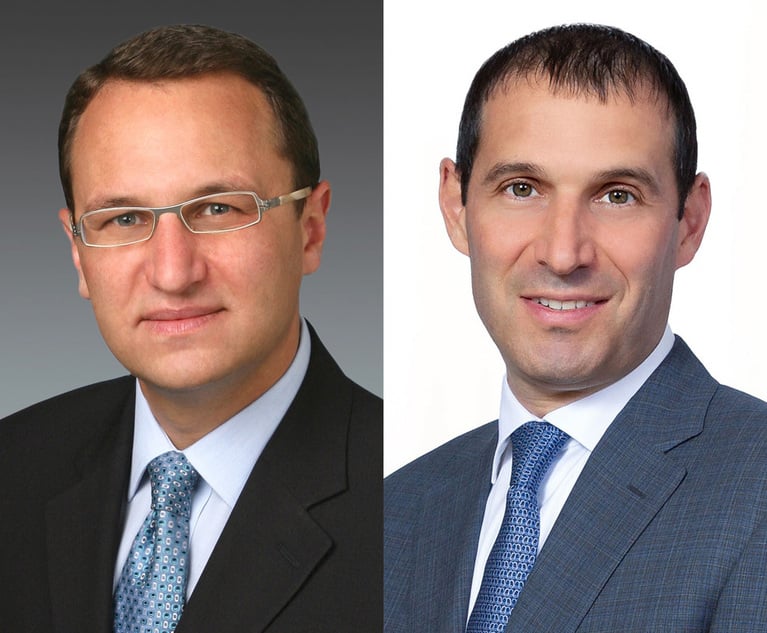Third Circuit Denies Bid to Fast Track Appeal in $1.2B Venezuela Arbitration Dispute
Judge Luis Felipe Restrepo of the U.S. Court of Appeals for the Third Circuit on Wednesday ruled that oral argument on Petróleos de Venezuela S.A. appeal in the case would proceed normally.
January 03, 2019 at 04:39 PM
4 minute read
 Citgo gas station. Photo: Ken Wolter/Shutterstock.com
Citgo gas station. Photo: Ken Wolter/Shutterstock.com
A federal appeals court has denied a motion by a Canadian mining company to expedite an appeal of a district court order allowing it to seize shares of Citgo Petroleum's parent company to enforce a $1.2 billion award against Venezuela.
Judge Luis Felipe Restrepo of the U.S. Court of Appeals for the Third Circuit on Wednesday ruled that oral argument on Petróleos de Venezuela S.A. appeal in the case would proceed normally. Crystallex International Corp.. had claimed that the firm was helping the Venezuelan government avoid the judgment.
Crystallex said in a Dec. 21 court filing that PDVSA had breached a settlement agreement that required it to stay the appeal. PDVSA, however, countered last week that it was not a party to the settlement and accused Crystallex of trying to mislead the court.
Restrepo's one-page order Wednesday refused Crystallex' motion but did not specifically address the parties' contentions.
Venezuela is appealing multiple decisions by U.S. Chief Judge Leonard P. Stark, which paved the way for Crystallex to seize Citgo's shares in order to satisfy a 2016 arbitration awards over lost mineral rights. In August, Stark ruled that PDVSA was an alter ego of the Venezuelan government, which had exerted extensive control over the company's business operations. The ruling entered a writ of attachment for shares of PDVSA, which owns Citgo in the United States.
Last month, Crystallex revealed in court filings that it had reached a settlement with Venezuela, establishing a framework for resolving the dispute. According to court papers, Venezuela completed an up-front payment of $425 million Nov. 23, on top of $75 million that it had already turned over.
In its motion before the Third Circuit, Crystallex said that the settlement agreement obligated PDVSA to to stay its appeal to give Venezuela more time to gather collateral to secure the remainder of the payment.
“PDVSA's actions constitute a clear breach of the Settlement Agreement and make it urgent that Crystallex immediately resume its enforcement efforts against Venezuela's property in Delaware and elsewhere,” Crystallex' Gibson, Dunn & Crutcher and Richards, Layton & Finger attorneys argued.
PDVSA, in its response, questioned Crystallex' motives in filing its motion for expedition at 10 p.m. Dec. 21, just ahead of the four-day Christmas holiday. The firm said that had never signed the settlement agreement between Crystallex and Venezuela, and accused Crystallex of misrepresenting the basis of its argument.
“The primary basis for Crystallex's argument is the text of a document appended to the declaration of Crystallex's counsel that is represented to be a true and correct copy of the Agreement,” PDVSA said. “It is not the [settlement] agreement. Crystallex knows it is not the [settlement] agreement, and its attempt to mislead this court is nothing less than sanctionable.”
Briefing on PDVSA's appeal is scheduled to conclude Jan. 30. A date for oral arguments has not yet been set.
Crystallex is represented by Robert L. Weigel, Jason W. Myatt, Rahim Moloo and Miguel A. Estrada of Gibson Dunn's New York and Washington, D.C., offices. Raymond J. DiCamillo, Jeffrey L. Moyer and Travis S. Hunter of Richards Layton are acting as local counsel.
PDVSA is represented by Joseph D. Pizzurro, Kevin A. Meehan, Julia B. Mosse and Juan Perla of Curtis, Mallet-Prevost, Colt & Mosle in New York and Samuel T. Hirzel II of Heyman Enerio Gattuso & Hirzel in Wilmington.
The case is captioned Crystallex International v. Venezuela.
This content has been archived. It is available through our partners, LexisNexis® and Bloomberg Law.
To view this content, please continue to their sites.
Not a Lexis Subscriber?
Subscribe Now
Not a Bloomberg Law Subscriber?
Subscribe Now
NOT FOR REPRINT
© 2025 ALM Global, LLC, All Rights Reserved. Request academic re-use from www.copyright.com. All other uses, submit a request to [email protected]. For more information visit Asset & Logo Licensing.
You Might Like
View All
Solar Company: Restrictive Covenant Circumstances Require Chancery Blue Penciling
3 minute read
Delaware Court Postpones Citgo Bid Hearing Until September as Venezuela Gets Close to Losing Oil Refiner

Climate-Change Lawsuits Are Spiking. Could They Be the Next Tobacco Litigation?
7 minute readTrending Stories
- 1Some Thoughts on What It Takes to Connect With Millennial Jurors
- 2Artificial Wisdom or Automated Folly? Practical Considerations for Arbitration Practitioners to Address the AI Conundrum
- 3The New Global M&A Kings All Have Something in Common
- 4Big Law Aims to Make DEI Less Divisive in Trump's Second Term
- 5Public Notices/Calendars
Who Got The Work
J. Brugh Lower of Gibbons has entered an appearance for industrial equipment supplier Devco Corporation in a pending trademark infringement lawsuit. The suit, accusing the defendant of selling knock-off Graco products, was filed Dec. 18 in New Jersey District Court by Rivkin Radler on behalf of Graco Inc. and Graco Minnesota. The case, assigned to U.S. District Judge Zahid N. Quraishi, is 3:24-cv-11294, Graco Inc. et al v. Devco Corporation.
Who Got The Work
Rebecca Maller-Stein and Kent A. Yalowitz of Arnold & Porter Kaye Scholer have entered their appearances for Hanaco Venture Capital and its executives, Lior Prosor and David Frankel, in a pending securities lawsuit. The action, filed on Dec. 24 in New York Southern District Court by Zell, Aron & Co. on behalf of Goldeneye Advisors, accuses the defendants of negligently and fraudulently managing the plaintiff's $1 million investment. The case, assigned to U.S. District Judge Vernon S. Broderick, is 1:24-cv-09918, Goldeneye Advisors, LLC v. Hanaco Venture Capital, Ltd. et al.
Who Got The Work
Attorneys from A&O Shearman has stepped in as defense counsel for Toronto-Dominion Bank and other defendants in a pending securities class action. The suit, filed Dec. 11 in New York Southern District Court by Bleichmar Fonti & Auld, accuses the defendants of concealing the bank's 'pervasive' deficiencies in regards to its compliance with the Bank Secrecy Act and the quality of its anti-money laundering controls. The case, assigned to U.S. District Judge Arun Subramanian, is 1:24-cv-09445, Gonzalez v. The Toronto-Dominion Bank et al.
Who Got The Work
Crown Castle International, a Pennsylvania company providing shared communications infrastructure, has turned to Luke D. Wolf of Gordon Rees Scully Mansukhani to fend off a pending breach-of-contract lawsuit. The court action, filed Nov. 25 in Michigan Eastern District Court by Hooper Hathaway PC on behalf of The Town Residences LLC, accuses Crown Castle of failing to transfer approximately $30,000 in utility payments from T-Mobile in breach of a roof-top lease and assignment agreement. The case, assigned to U.S. District Judge Susan K. Declercq, is 2:24-cv-13131, The Town Residences LLC v. T-Mobile US, Inc. et al.
Who Got The Work
Wilfred P. Coronato and Daniel M. Schwartz of McCarter & English have stepped in as defense counsel to Electrolux Home Products Inc. in a pending product liability lawsuit. The court action, filed Nov. 26 in New York Eastern District Court by Poulos Lopiccolo PC and Nagel Rice LLP on behalf of David Stern, alleges that the defendant's refrigerators’ drawers and shelving repeatedly break and fall apart within months after purchase. The case, assigned to U.S. District Judge Joan M. Azrack, is 2:24-cv-08204, Stern v. Electrolux Home Products, Inc.
Featured Firms
Law Offices of Gary Martin Hays & Associates, P.C.
(470) 294-1674
Law Offices of Mark E. Salomone
(857) 444-6468
Smith & Hassler
(713) 739-1250







